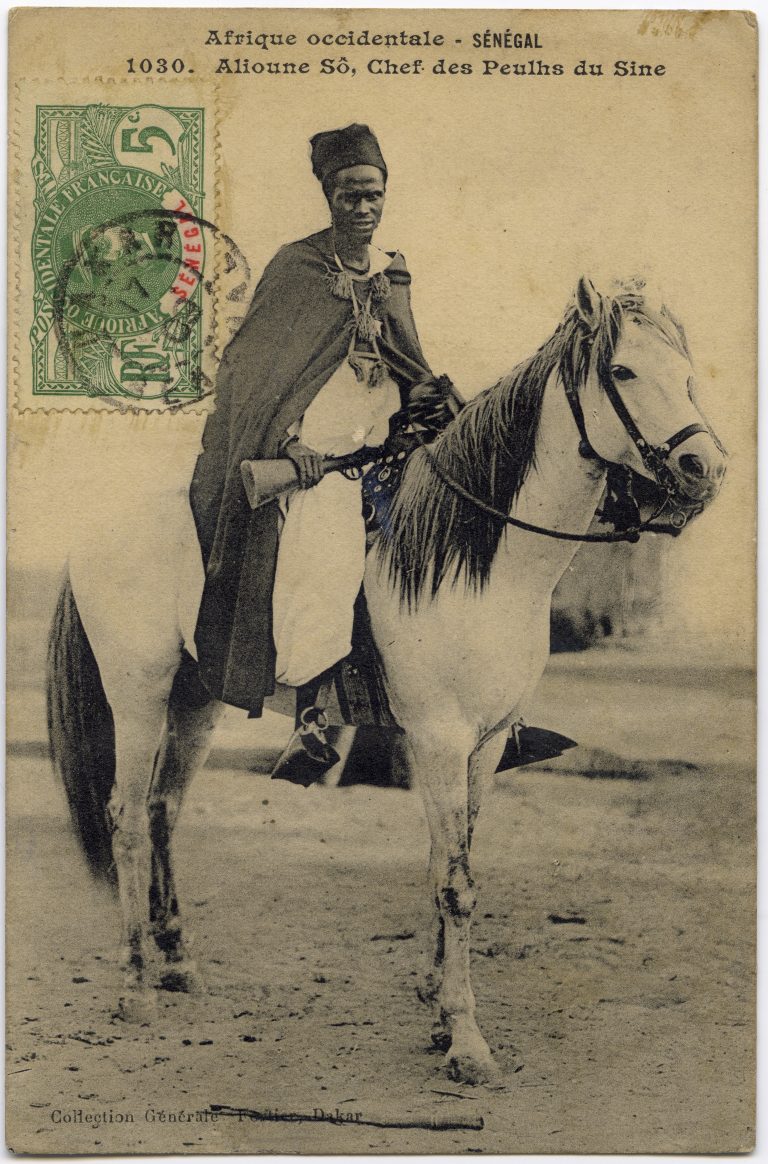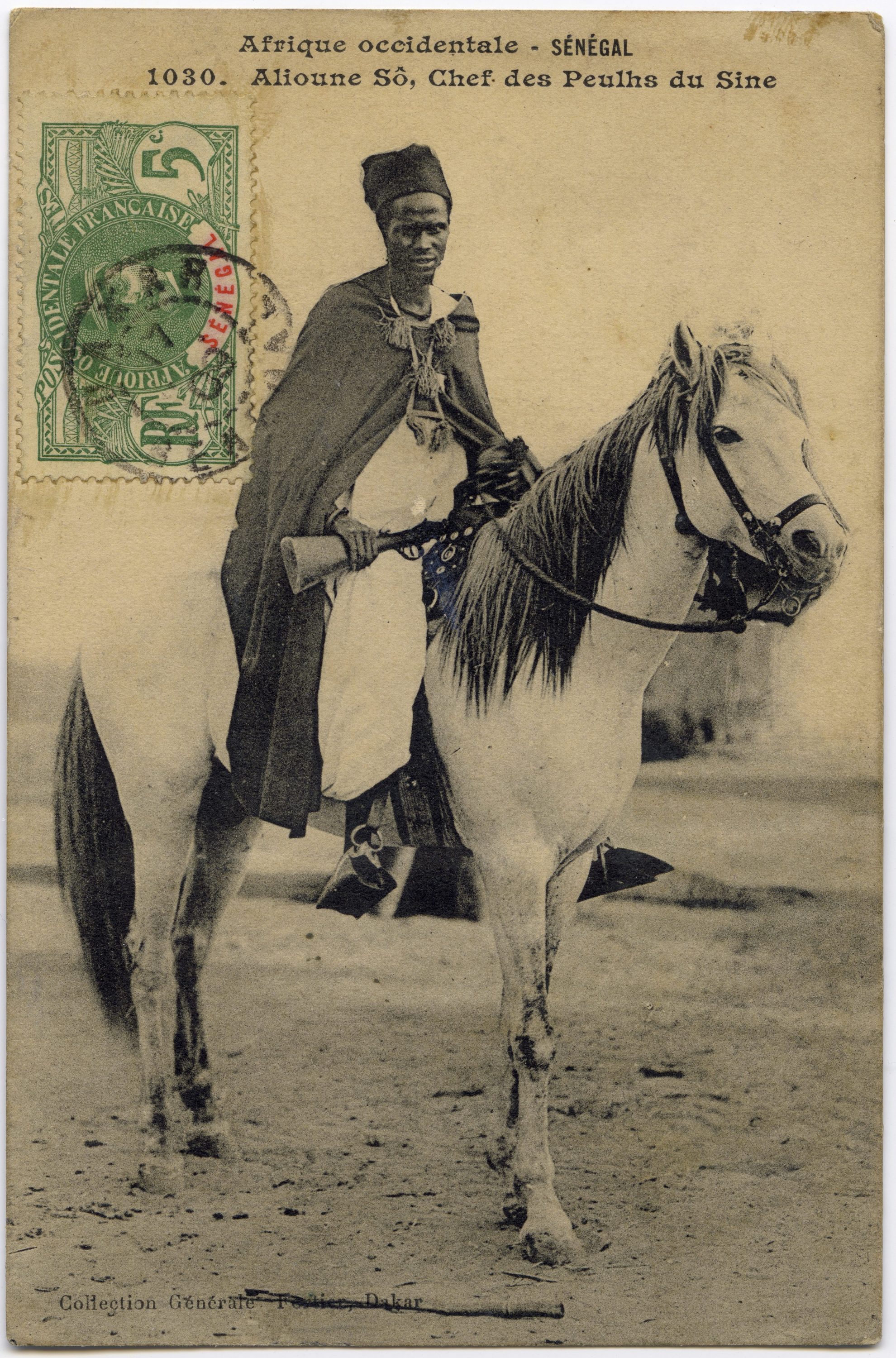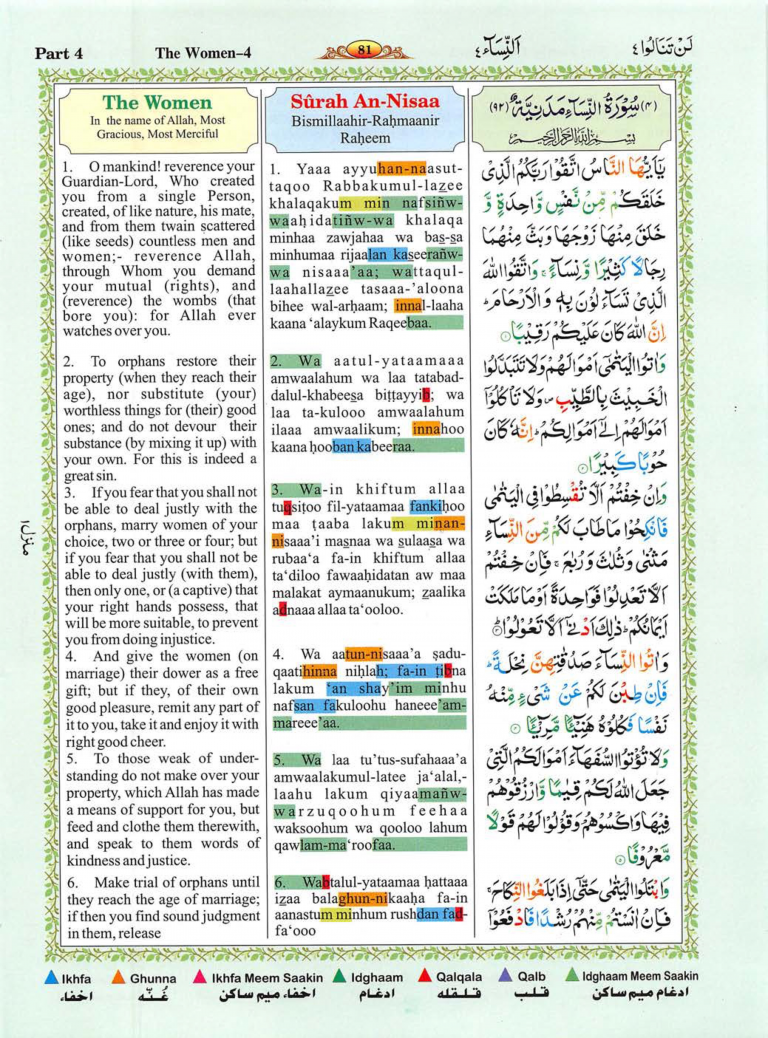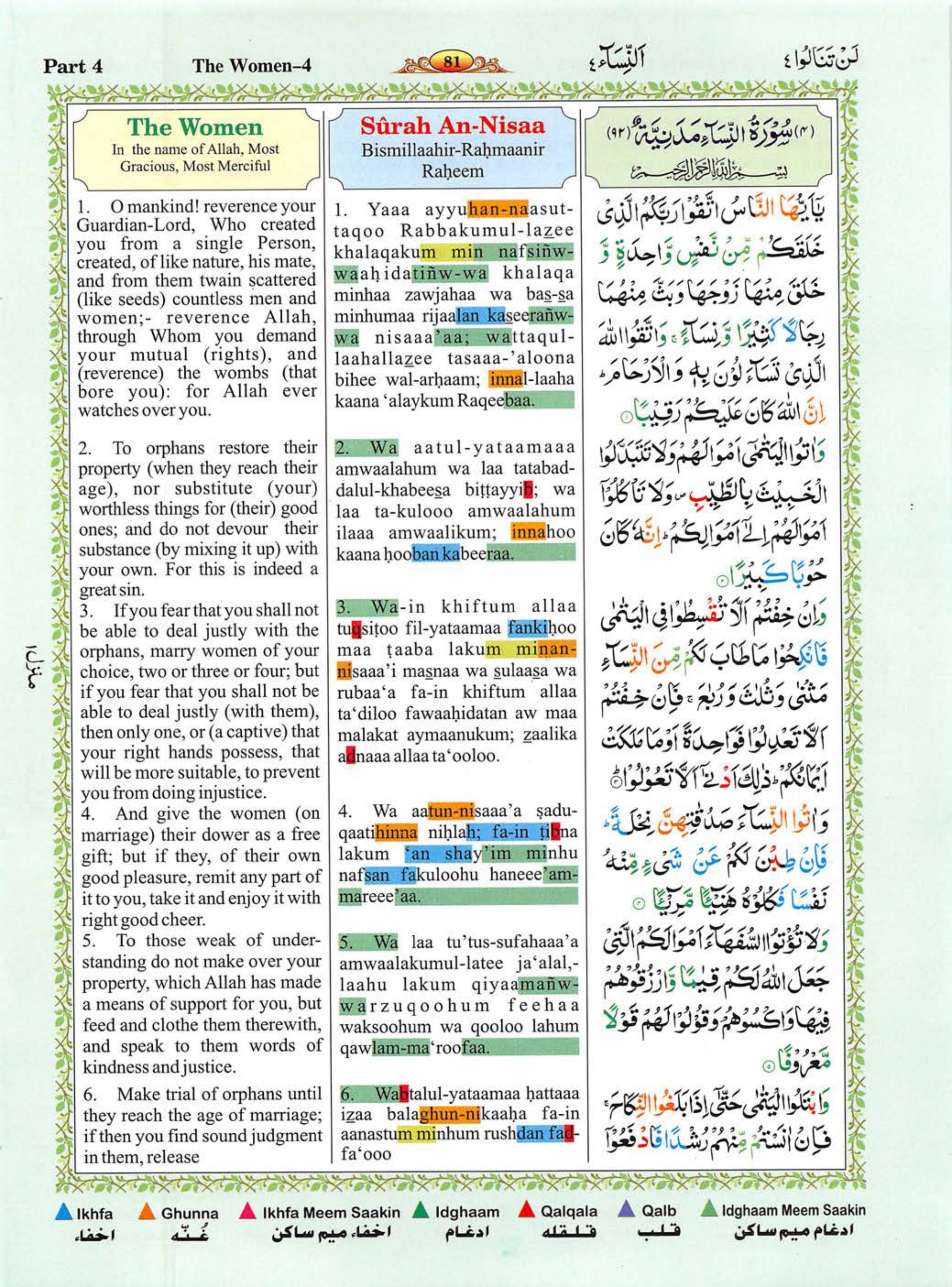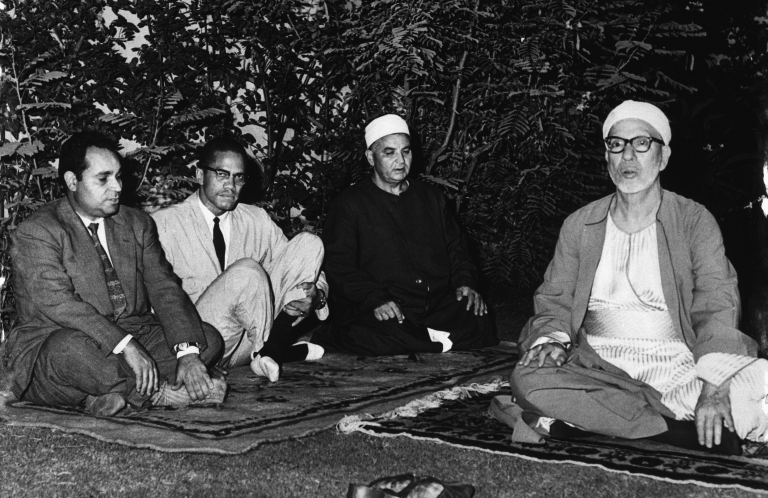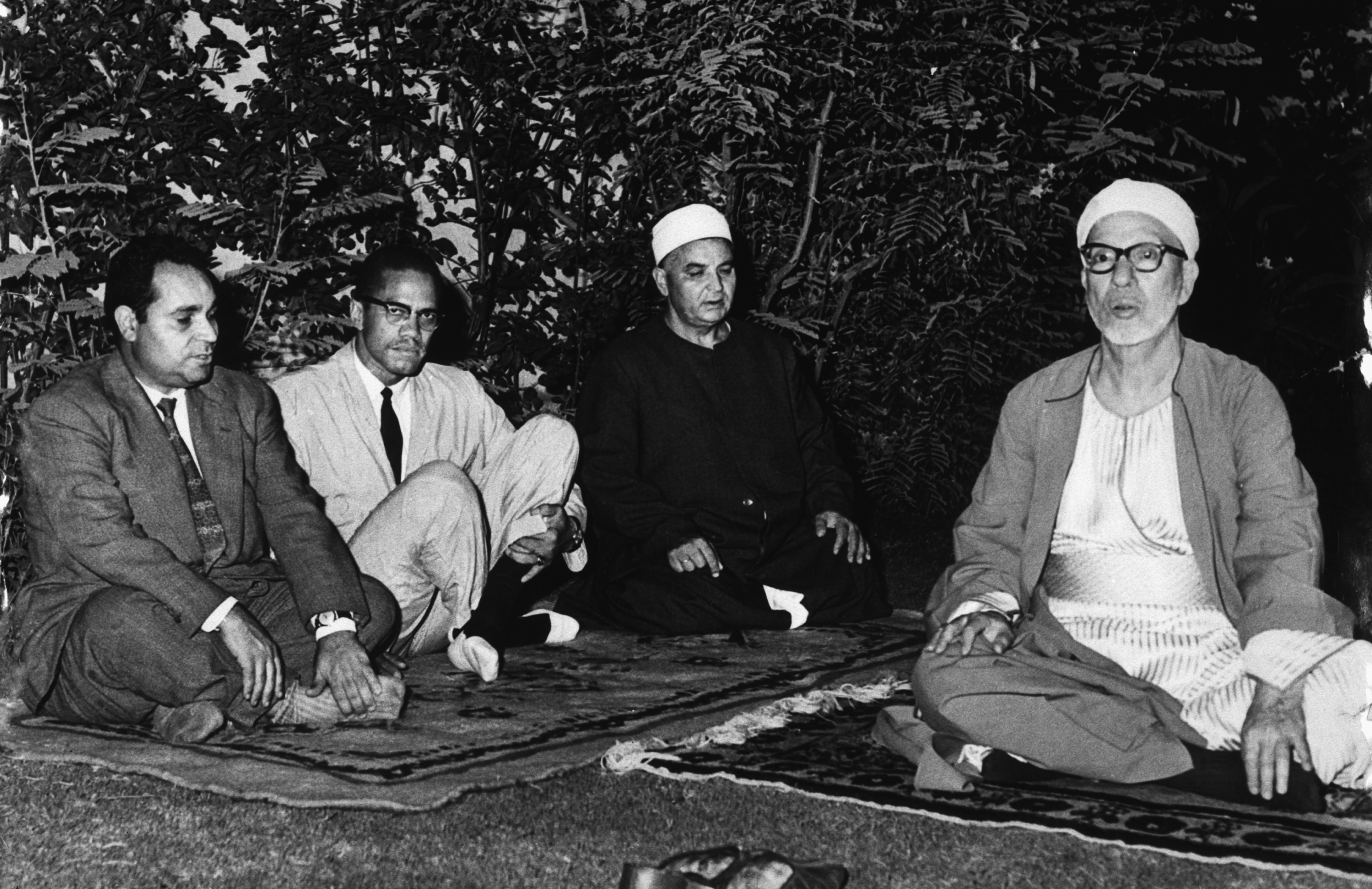Samba Diallo’s Times
Ambiguous Adventure begins with affecting descriptions of two bodies. One is Samba Diallo, the young child whom his teacher, Thierno, is subjecting to severe corporeal punishment for incorrectly reciting the Quran. The teacher berates the student while pinching his thigh. Suppressing his instinctive reaction, Samba corrects himself and recites again. Thierno acknowledges the correction but then rages that his carelessness had earlier caused him to miss what he clearly knew to do well. At this point, he is pinching the cartilage in Samb’a ear to the point of bleeding.
Color-coded Quran for learning recitation. The terms at the bottom indicate how the reciter must treat the sounds when pronouncing the Arabic text.
Source

Color-coded Quran for learning recitation. The terms at the bottom indicate how the reciter must treat the sounds when pronouncing the Arabic text.
While all this happens for everyone to see, in his inner thoughts, Thierno is shown to admire the child. He deems his precocious seriousness commensurate with his birth in the community’s hereditary leading family. Once the lesson finishes, Samba remains in front of Thierno, observing the teacher’s creaking body, battered from age and years of hard physical labor in the fields. Inwardly, Thierno himself reflects detachedly on his barely ambulatory body in a nonmalicious, mocking way.
Observing each other, Thierno and Samba embody different yet equally significant junctures in the human life cycle. Thierno is approaching death, his physical powers breaking down even as the mind remains assertive. Samba is at an age when he can, and must, acquire certain competences before it is too late. His mind and body need a kind of molding for him to lead a proper life in the future. As Thierno tells the community’s chief, who is Samba’s cousin, a little later, “what we teach the children is God. What they forget is themselves, their bodies, and the futile dream which hardens with age and stifles the spirit. So what they learn is worth infinitely more than what they forget” (34).
Both Thierno and Samba understand why it is important for the latter to recite the Quran correctly irrespective of knowing the words’ meaning. The text represents timeless wisdom, although the value of timelessness derives from the notion of time itself. In other words, timelessness has no describable content and is a condition definable only through negation of time’s otherwise inescapable grip. The child’s body is material, its growth and eventual demise marking a lifetime, the ultimate clock for measuring human existence. Islam as a part of this existence is produced through intertwining the Quran’s timelessness into the incipient body and mind.
Thierno’s severe actions on children like Samba are an urgent matter that would be futile to undertake on older people. Pegged between birth and death, human existence is a cycle of limited length and a particular rhythm, which Thierno is attempting to conjoin to that of the Quran. Inflicted by the teacher and endured by the student, bodily pain encapsulates the absorption of a measure of eternality into bodies eventually bound for death.
Past the novel’s opening scenes, Samba’s life transforms when he is taken from Thierno’s hearth and is placed in a French school due to the community’s need to survive under French colonial rule. The agonizing decision is implemented by the novel’s most forceful character, the Most Royal Lady (la Grande Royale), who is the community’s de facto ruler in the name of her younger brother, the chief of the Diallobé. Kane’s description of Samba’s view of this lady’s face includes the personification of Islam as an agent intertwined into time and history:
[Her face] was like a page from the history of the Diallobé country. Everything that the country treasured of epic tradition could be read there. All the features were in long lines, on the axis of the slightly aquiline nose. The mouth was large and strong, without exaggeration. An extraordinarily luminous gaze bestowed a kind of imperious lustre upon this face. All the rest disappeared under the gauze, which, more than a coiffure would have done, took on here a distinct significance. Islam restrained the formidable turbulence of those features, in the same way that the little veil hemmed them in (20-21).
In this case, time is registered through contrasting two elements of the same body rather than comparing across two bodies. Islam is represented by the veil rather than the sacred text: it encircles and restricts the heroism that derives from the community’s epics and is typified by the Most Royal Lady’s powerful persona. But similar to the co-constitution of old Thierno and young Samba, the face and the veil, Islam and the epic tradition, are interdependent. They coarticulate as an ethos in the community’s life before modernity.
Samba’s spatiotemporal positioning undergoes a radical change when we read about him attending the French colonial school. Here too, he is a star pupil, now able to regurgitate the history and geography of France that he has absorbed from books without yet having had any direct experience of Europe (52–53). These elements substitute for the village teacher’s insistence on properly reciting the Quran. Both types of knowledge require accepting authority deriving from the unseen.
Subsequently, he pursues philosophy in Paris, dwelling on the work of Plato, Augustine, Pascal, and Descartes to understand the roots of Western ideas as well as their transformation (and perhaps betrayal) in the early modern period. His studies and social interactions make him ever more distant from his origins. What he gains in knowledge fails to provide a sense of well-being. In a conversation, he states the following:
It still seems to me that in coming here I have lost a privileged mode of acquaintance. In former times the world was like my father’s dwelling: everything took me into the very essence of itself, as if nothing could exist except through me. The world was not silent and neuter. It was alive. It was aggressive. It spread out. No scholar ever had such knowledge of anything as I had then, of being… Here, now, the world is silent, and there is no longer any resonance from myself. I am like a broken balafong, like a musical instrument that has gone dead. I have the impression that nothing touches me any more (149-150).
The time, space, and experience of being in the West eliminates Samba’s sense of belonging to the environment of his birth while offering a mechanical life in return. Echoing the recitation of the Quran, the loss is marked by the absence of vitalizing sound.
Samba’s condition derives from an instrumentalist temporality that provides history as the sole basis for the temporal orientation of the self with respect to land and other people. Samba encounters Marxism and anticolonialism, ideological stances that run counter to dominant forms of modernity, such as colonialism, that he has experienced. But these perspectives are also instrumentalist, tied to a timescale that offers class struggle and material ends as panaceas for his unease. He finds modern Western temporality confining and exasperating rather than freeing, and yet he cannot transcend it by returning to his earlier life.
Samba’s increasing distance from the world of his childhood manifests through his inability to offer the daily prayers. This is understood as a loss of both Islam and being African. His body is shedding the imprint made on it by his childhood teacher. Intuiting a dangerous dissolution, his father sends him the following plea:
Malcolm X visiting a Muslim scholar in Cairo (1964). In his autobiography, he writes about the challenge of making his adult body bend in new ways after becoming a Muslim.
Source

Malcolm X visiting a Muslim scholar in Cairo (1964). In his autobiography, he writes about the challenge of making his adult body bend in new ways after becoming a Muslim.
SOURCE
Bettmann / Contributor, Getty Images U1433296
It is high time that you should come back, to learn that God is not commensurable with anything, and especially not with history, whose vicissitudes are powerless in relation to His attributes. I know that the Occident, to which I have been so wrong to send you, has a different faith on that score—a faith of which I recognize the utility, but which we do not share. Between God and man there exists not the slightest consanguinity, nor do I know what historic relationship. If there were, our recriminations would have been admissible. We should have been entitled to harbor resentment against Him for our tragedies, which would manifestly have revealed His imperfections. But this is not the case. God is not our parent. He is entirely outside the stream of flesh, blood, and history which links us together. We are free! See, now, why it seems to me unlawful to found the vindication on history, and senseless to rail against God by reason of our misery (162).
Articulating the novel’s persistent framing, Samba’s father creates a separation between worldly travails and certitude regarding divine presence. This is a theological position in which God is an omnipresent being not bound by the material and moral calculus of human existence. Being a Muslim in the correct way means accepting God’s extratemporal presence and carrying out, in time, his prescriptions through cultivating correct thoughts and actions.
To be free means to create one’s life in the world, the test being whether this is done wantonly or according to proper interpretation of the truth revealed as a result of God’s intervention in the world. This is Islam, namely a set of forms that materializes through bodies like that of Samba’s old teacher Thierno. To be unable to take up the form required in prayer is to become alienated from God and the life force of the community.
The physical diminishment Samba experiences while in Paris continues once he returns home. Its dénouement comes when the fool kills Samba because he refuses to promise that he will pray at the teacher’s grave. The novel’s last paragraph contains an extended meditation on time:
The moment is the bed of the river of my thought. The pulsations of the moments have the pulsations of thought; the breath of thought glides into the blowpipe of the moment. In the sea of time, the moment bears the image of the profile of man, like the reflection of the kalcédrat [tree] on the sparkling surface of the lagoon. In the fortress of the moment, man in truth is king, for his thought is all-powerful, when it is. Where it has passed, the pure azure crystallizes in forms. Life of the moment, life without age of the moment which endures, in the flight of your élan man creates himself indefinitely. At the heart of the moment, behold man as immortal, for the moment is infinite, when it is. The purity of the moment is made from the absence of time. Life of the moment, life without age of the moment, which reigns in the luminous arena of your duration man unfurls himself to infinity. The sea! Here is the sea! Hail to you, rediscovered wisdom, my victory! The limpidness of your wave is awaiting my gaze. I fix my eyes upon you, and you harden into Being. I am without limit. Sea, the limpidity of your wave is awaiting my gaze. I fix my eyes upon you, and you glitter, without limit. I wish for you, through all eternity (177-178).
Interview with Cheikh Hamidou Kane in 2018. Footage from 1961 shows him saying, among other things, “I cannot imagine a future that would simply make black Europeans out of us.”
The novel’s conclusion on this epiphanic statement is striking given that the story ends on a tragedy. The rumination on time reinforces the work’s overall insistence that, made up of moments, human life is simultaneously trivial and infinitely valuable. The experience of time is both atemporal eternity and lived history, the interdependent opposites being necessary to understand the human condition.
The religious, psychological, and sociopolitical issues taken up in Kane’s Ambiguous Adventure have loomed large for vast populations around the world over the last two centuries. It is important to remember that it is fiction, an imaginary construct whose dialogues and dramatic events are metaphors for the complex reality being explored. In words from Samba’s father I have quoted above as well as elsewhere in the novel, history is devalued as a human affair. We can be sure that when writing the book, Kane was well aware that Africa has a history that we can find recorded in literary representation of the past spanning many centuries. His play on history is keyed to European notions about Africa as a continent without history and signifies the possibility of alternative time regimes rather than the emptiness presumed for Africa in racist European thought.
Kane takes histories that have eventually led up to colonial and postcolonial times for granted. He artfully invents a lived Islam in West Africa that illuminates both modernity and that which it has changed forever. His characters are typological composites, and we see them acting in highly stylized ways, conveying complexity through precise and economical imagery. Kane’s romanticized view of African and Islamic life is a backdrop to show modernity’s disruptive character, exemplified most emphatically in divergence over temporalities. Ruminating and imagining, Kane highlights what is at stake in conceptualizing time and the past in variant ways.


